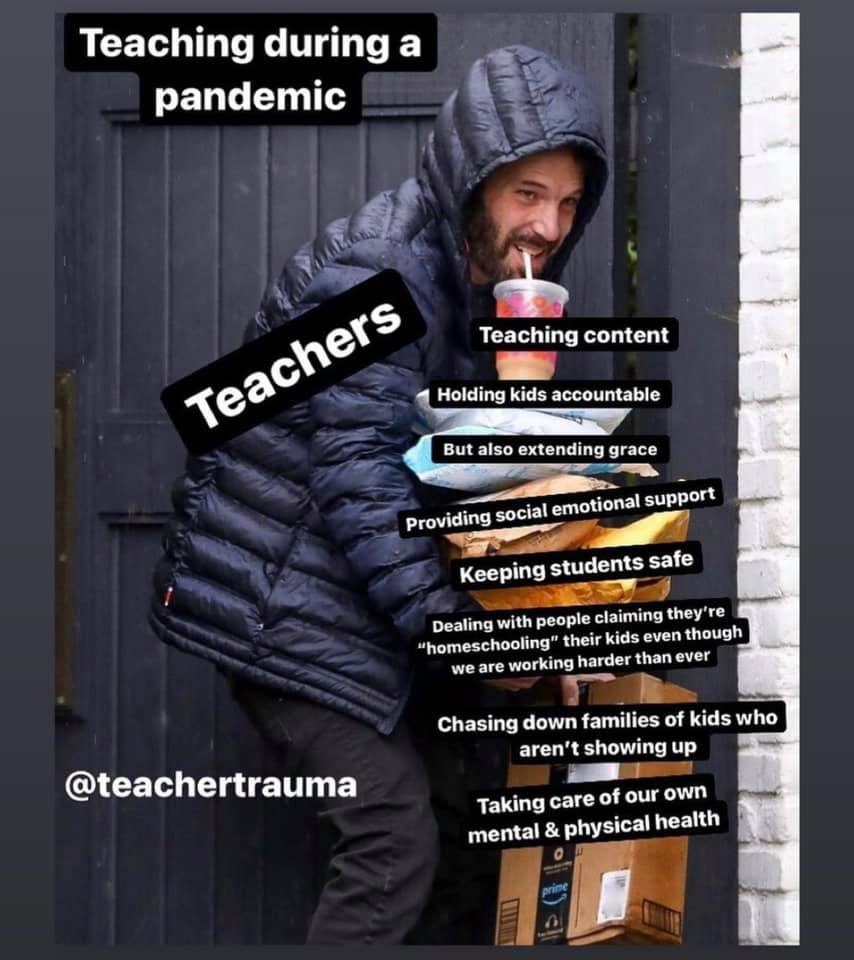|
My friend and fellow educator Sharri Conklin recently posted this on Facebook and I invited her to post it here as a guest blogger.
One year ago, I was going to school each day, worry growing as the news updated us each day with what was coming. One year ago this Friday, our school sent us home. I held it together all day to support my students, but the pit in my stomach knew this was different than anything we had ever experienced before. I have held my students through the death of a beloved staff member, 9/11, school shootings and the daily crises that come with living. This felt different. This felt heavy in a way I had never experienced. As I walked my students to the buses, carrying everything we could think to send home, I began to lose it. I smiled and waved to them as they drove off. When I turned around to head back in the building, I couldn’t hold it in anymore. I went into a room and couldn’t stop crying. Since then, I, along with my colleagues, have learned how to teach through the computer. We took everything we knew about how to teach and adapted it, with no training, to engage students, to keep learning moving forward and to hold social emotional lives during a global pandemic in our hands. Each time we needed to, we recreated what we do to adapt to this new situation, all while trying to run our own households, keep ourselves and our families safe and healthy and moving forward. We bought monitors and computers and upgraded our WIFI and watched videos on how to take everything we did in person and make it accessible through the computer. We connected with families to make sure they were fed and had access to technology and WIFI. We taught students and families how to access learning without being in person with them to do so. Some of our colleagues have since returned to their in person classrooms, some have stayed remote and some have done a combination. Some of us have been heralded, some of us vilified and all of us have felt a combination of all those feelings for ourselves at one time or another. Good teaching is adapting. It’s what we do. Adapt to the unique learners, the new standards, the new methods, the new rules that change overnight. And we do this because we love our kids and our community. We really don’t ask for a lot. We spend our own money, spend our own time and lose our own sleep over our jobs. We are, at once, not important enough because families can teach their own kids at home without us and so important that families can’t function if their children aren’t in school. We get it. Life is messy and hard and changes on a dime. We get it. It’s what happens in a day, in an instant, in schools all the time when there’s a shooting or a death or a job loss of a parent or a deportation or a jailing or DCF report of abuse or systemic racism or a global pandemic. It’s emotional and it’s draining. We are sorry this school year has been unlike any other. We are anguished that students and families are suffering. But it’s not all on us. We are fighting to keep ourselves and our families safe and sane and healthy, too. We are sorry we can’t ignore everything in our own lives to come in person to help your family who is also suffering. Just like you, we have personal experiences and unique family situations that force us to make hard decisions. But none of us have not been working. None of us are lazy. None of us are looking for the easy way out. We are all just trying to make it through this global pandemic the best we can. So as things in our communities change in the next months as the state forces all schools to open buildings no matter what to any families who want their children to come back, please remember we are all doing the best we can. We will remember you are, too. Sharri Conklin has been an educator for more than 25 years. She is currently a 5th grade teacher in Amherst, MA.
1 Comment
 We've passed the one year mark of the first COVID case in Massachusetts, and it's been more than a year since the first cases were reported in the U.S. March 13 will make a year that I haven't taught inside my school building. We left school that day thinking we'd be gone for 2 weeks, but by the beginning of the second week, I had a feeling it would be much longer. I've been teaching remotely for a year. Teaching is an exhausting profession in normal times, but I find myself tired in a way I didn't know before. It's not the same tired as when I was the new mom of 3 kids under the age of 3 - a physically exhausting kind of tired. It's different from the tired I felt of working full time and getting my Master's, when my kids were 7, 5 and 4. This is different. I've read a lot about stress and how it manifests, and the stress people are feeling during the pandemic, and I recognize it. The foggy-brain, the lack of motivation, the sheer exhaustion. I'm usually a motivated, organized person who structures all of her time, so when I feel this lack of energy and focus, I have a hard time understanding what's happening. I am learning to have compassion for myself and be more forgiving of others, too. Teaching remotely, or online, should be easier, or so people think. The fact is that I put so much energy and thought into every single lesson that it leaves me spent at the end of each day. Teaching online leaves no room for winging it. Once I have my students with me, I need to keep them with me. I want to engage them, give them work, hold them to high expectations - but not too high, because I don't want them to check out. I have a student teacher, which is amazing, because she's great and there are two of us to put our heads together to plan and create activities. And yet, I am still exhausted in this new way I hadn't known before. So, no - teaching online is not easier just because I'm home. Sure, I can take care of some household tasks, enjoy a quiet cup of tea for a few minutes, or pet my dogs, and all of that makes teaching remotely feel more humane - but not easier. I know I'm luckier than many teachers: my kids are in their late teens and don't need much supervision; I like my family and we get along well; we each have a dedicated space from which to "do school" (though mine is my bedroom, I don't have to share it with anyone); my union is strong and supportive of all teachers; I was granted the right to stay remote because of health (unlike in some districts, mine has been great about this); my kids' mental health is pretty intact; I'm in a two parent household and I have job security. I know people are struggling. People all over the country are going through an extremely challenging time. The consequences of the pandemic are far-reaching and staggeringly tragic. But - teachers are being blamed for things that are beyond our control. We are being blamed for being fearful, not listening to science, only caring about ourselves. We are being blamed for hiding behind our unions, and they are being blamed for fear-mongering. We are being blamed for the state of the mental health of students, for the inequities that are finally coming to light but which we were seeing every day in our schools, and for kids falling behind this year. Yet, teachers in my state are not eligible to be vaccinated yet, schools have windows that don't work or that you wouldn't want to open when it's 12 degrees out like today, and not all of our schools are physically ready to reopen. The pandemic has only made things that I knew much more clear to me. Injustices and inequities in our schools are urgent matters that needed our attention before, and need it even more now. Standardized tests were inequitable before, and will be even more so this year if schools administer them, like Governor Baker in MA wants to do. My union is here to support me; I AM the union. My fellow teachers and I are a community. My students know I care for them and they matter to me. Teacher voices need to be heard, amplified, and included in conversations, especially about policy and funding. And on a personal level, my well-being and health come first. Self-care has a new meaning for me. I still love my profession. And - my family is everything. |
|

 RSS Feed
RSS Feed
